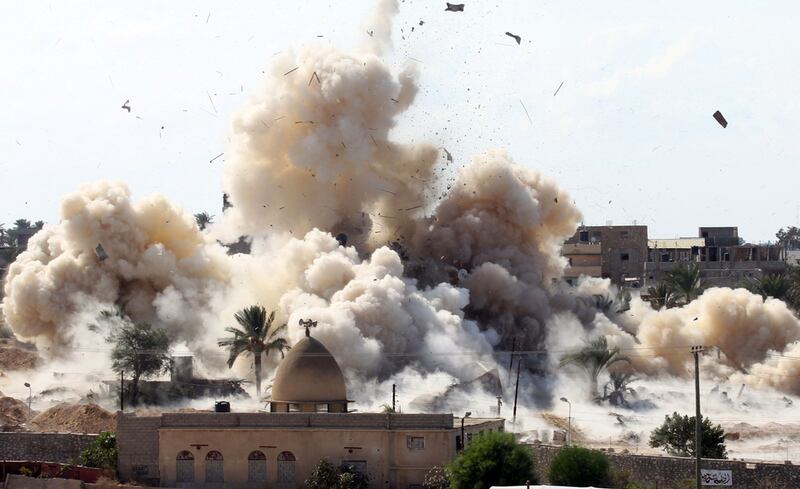After the killing of more than 30 military personnel in Sinai a week ago, there is no question that the Egyptian state faces a dangerous insurgency. But that is not where the debate ought to be – it should be over the issue of how to end that insurgency altogether and not prolong it.
Last week’s killing in and near Sinai’s main town of the north, Al Arish, was the bloodiest against the Egyptian military in recent memory.
It was to be expected there would be a response from the state. The question is what sort of response would be both ethical and effective.
A week later, a number of actions require further scrutiny. In recent days, hundreds of houses in Rafah, the border city between Egypt and the occupied Palestinian territory of Gaza, have been evacuated. Many of those houses have been demolished.
The strategy is to create a buffer zone between Gaza and Egypt, on Egyptian territory, as the suspicion is that the Sinai insurgents have relations with extremist groups in Gaza. Questions must be raised about how this evacuation was achieved. Were all those who were evacuated and relocated content and satisfied with the arrangement? Are they all on board with the strategy?
There is also a security dimension to a forced relocation. In any counterinsurgency operation, a key consideration is to not only combat existing insurgents, but to make it difficult for insurgent recruitment to be successful in the future.
In that regard, extra caution must be taken to ensure that radical groups have as few vulnerable individuals or groups to target for recruitment. Steps that result in resentment or bitterness – both likely outcomes in a forced relocation exercise – run the risk of increasing the number of individuals who will be vulnerable to radical recruitment.
Another key consideration in counterinsurgency tactics is to increase cooperation between local populations and the authorities fighting against the insurgents. Has that been taking place in the Sinai?
It is unclear. Very few journalists are able to interrogate the situation in Sinai with any real depth, owing to various restrictions on the ground. What reports have come out indicate growing resentment in general – the forced relocations are likely to result in even more dissatisfaction. It is difficult to see how widespread that sentiment is – and that is a cause for concern.
These are only a few of the questions that need to be raised. Beyond Sinai, there is a much longer border on the western side of Egypt, which runs alongside Libya.
The possible threat emanating from there, with elements like Ansar Al Sharia in Benghazi and ISIL-like elements in Derna, is potentially far more dangerous than anything coming from Gaza. How will the authorities respond to that threat? Could a buffer zone also work here – and over such an extensive territory?
Ordinarily, one would expect accountability to emanate from a parliament and the media. In Egypt’s case, there is no parliament to do so, while most Egyptian media organisations have stated that criticism of the authorities would not be something they would entertain.
For years, various analysts in Egypt have recognised that the vast underdevelopment of the Sinai peninsula and the lack of opportunities there have acted as powerful tools for recruitment. These circumstances do not send Sinai residents into the arms of the insurgents, but they do make them more vulnerable to being exploited by recruiters. That is a situation that Egypt cannot afford.
Egypt faces a genuine security threat in Sinai and how the government responds to this is incredibly important. A critical part of that response must require the full buy-in and empowerment of the people of Sinai, as part of any counterinsurgency strategy, as well as the use of armed force against armed militants. Otherwise, this problem will fester for a long time to come.
Dr HA Hellyer is an associate fellow of the Royal United Services Institute in London, and the Centre for Middle East Policy at the Brookings Institution in Washington DC
Twitter: @hahellyer





